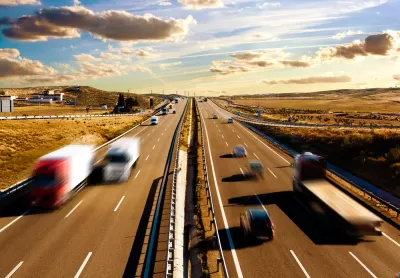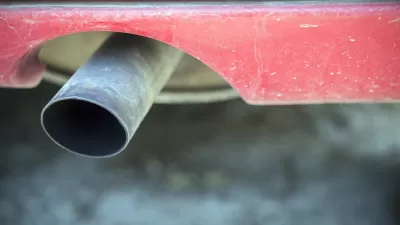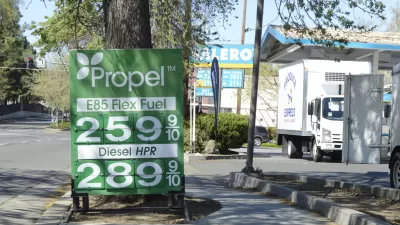EPA Administrator Scott Pruitt announced Monday that his agency is siding with auto manufacturers and relaxing greenhouse gas emission standards for new cars and light trucks.

"The Trump administration announced that fuel-efficiency regulations for cars and light trucks are too stringent and must be revised, beginning a process sought by the U.S. auto industry to roll back anti-pollution targets," report Ryan Beene, Jennifer A. Dlouhy, and John Lippert for Bloomberg Politics on April 2.
Per the April 2 announcement from the U.S. Environmental Protection Administration, the Midterm Evaluation process for the greenhouse gas (GHG) emissions standards for cars and light trucks for model years 2022-2025 has been completed. EPA Administrator Scott Pruitt determined that "the current standards are not appropriate and should be revised."
Current fuel efficiency standards of 54.5 MPG by 2025, "equivalent to roughly 36 mpg in real-world driving," according to Bloomberg, were finalized by the prior administration, and like virtually all environmental rules and agreements completed by the Obama administration, e.g., clean power plan rule and Paris climate agreement, Trump is intent on reversing them.
Affordability of purchase vs. efficiency in operation
Pruitt is framing the rollback as a means to make passenger vehicles, particularly the lucrative light truck market, which includes pricey SUVs and popular pickup trucks which are less fuel efficient than cars, more affordable, according to The New York Times. However, Michael Brune, president of the Sierra Club, charges that by relaxing fuel efficiency standards, "Americans will pay more at the pump while our air gets dirtier."
Next step
According to the announcement, EPA will commence a joint process "with the National Highway Traffic Safety Administration (NHTSA) to develop a notice and comment rulemaking to set more appropriate GHG emissions standards and Corporate Average Fuel Economy (CAFE) standards."
What about California? According to the announcement:
Under the Clean Air Act (CAA), EPA sets national standards for vehicle tailpipe emissions of certain pollutants. Through a CAA waiver granted by EPA, California can impose stricter standards for vehicle emissions of certain pollutants than federal requirements. The California waiver is still being reexamined by EPA under Administrator Pruitt’s leadership.
According to Bloomberg, "California officials vowed to resist a Trump-led rollback of the federal targets, with state Attorney General Xavier Becerra threatening a lawsuit and Air Resources Board Chairman Mary Nichols blasting the EPA’s move as a bid to 'demolish the nation’s clean car program.'"
Without an agreement between Washington and Sacramento, easing the federal standards could lead to a messy legal battle, a patchwork of efficiency standards, or both. The friction has broader implications for carmakers because California’s rules are followed by 12 other states that collectively account for about a third of U.S. auto sales.
As Amy Harder, energy and climate change reporter for Axios, told PBS Newshour anchor Judy Woodruff on Monday, "Today is really the very beginning of a long regulatory process. It might be more than a year before these things are final."
Hat tip to Darrell Clarke.
Extra reading: Editorial by The New York Times on the rollback: "Unclean at Any Speed: Pruitt’s Attack on Obama Auto Pollution Rule."
FULL STORY: EPA Moves to Cut Obama’s Auto Mileage Rules

Maui's Vacation Rental Debate Turns Ugly
Verbal attacks, misinformation campaigns and fistfights plague a high-stakes debate to convert thousands of vacation rentals into long-term housing.

Planetizen Federal Action Tracker
A weekly monitor of how Trump’s orders and actions are impacting planners and planning in America.

In Urban Planning, AI Prompting Could be the New Design Thinking
Creativity has long been key to great urban design. What if we see AI as our new creative partner?

King County Supportive Housing Program Offers Hope for Unhoused Residents
The county is taking a ‘Housing First’ approach that prioritizes getting people into housing, then offering wraparound supportive services.

Researchers Use AI to Get Clearer Picture of US Housing
Analysts are using artificial intelligence to supercharge their research by allowing them to comb through data faster. Though these AI tools can be error prone, they save time and housing researchers are optimistic about the future.

Making Shared Micromobility More Inclusive
Cities and shared mobility system operators can do more to include people with disabilities in planning and operations, per a new report.
Urban Design for Planners 1: Software Tools
This six-course series explores essential urban design concepts using open source software and equips planners with the tools they need to participate fully in the urban design process.
Planning for Universal Design
Learn the tools for implementing Universal Design in planning regulations.
planning NEXT
Appalachian Highlands Housing Partners
Mpact (founded as Rail~Volution)
City of Camden Redevelopment Agency
City of Astoria
City of Portland
City of Laramie




























